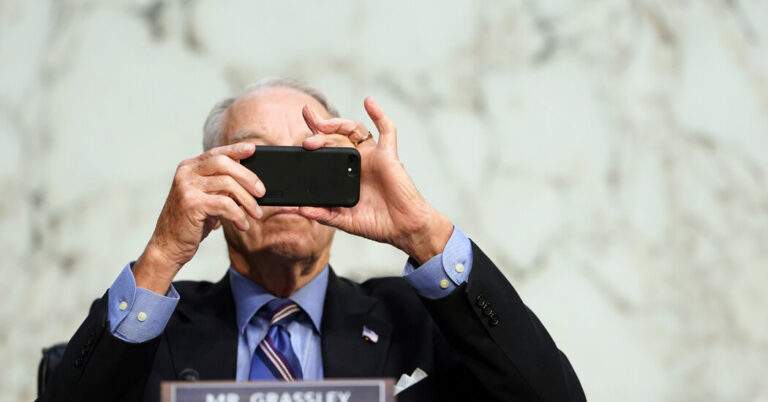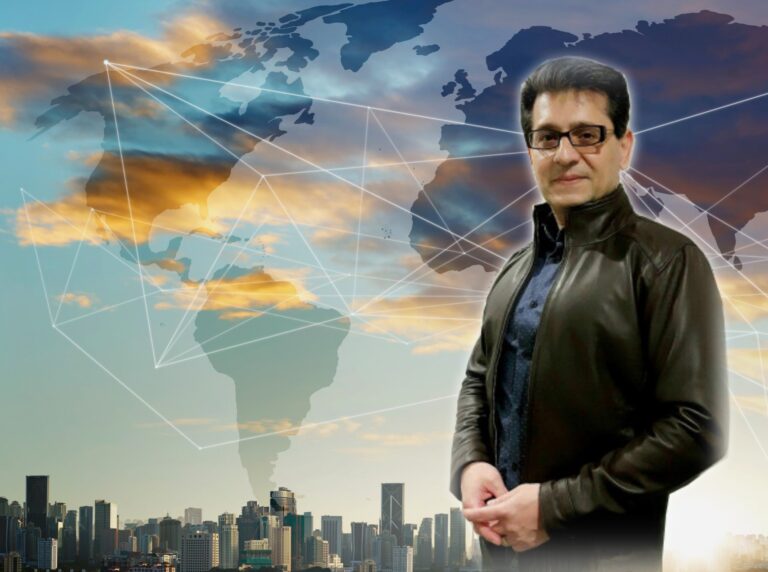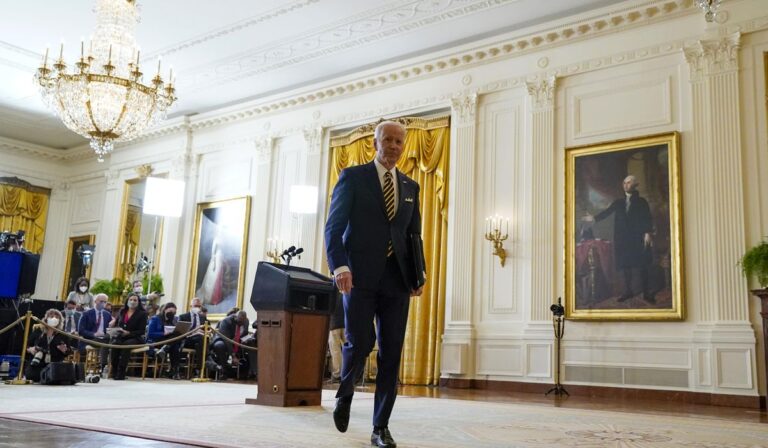
Lawmakers on Capitol Hill are readying a major push on bills aimed at restraining the power of the country’s biggest tech companies, as they see the window of opportunity closing quickly ahead of the midterm elections.
In a significant step forward, a Senate committee voted on Thursday to advance a bill that would prohibit companies like Amazon, Apple and Google from promoting their own products over those of competitors. Many House lawmakers are pressing a suite of antitrust bills that would make it easier to break up tech giants. And some are making last-ditch efforts to pass bills meant to strengthen privacy, protect children online, curb misinformation, restrain targeted advertising and regulate artificial intelligence and cryptocurrencies.
Most of the proposals before Congress are long shots. President Biden and top Democrats in Congress have said addressing the industry’s power is a high priority, but numerous other issues rank even higher on their list. These include passing voting rights legislation, correcting labor and supply chain constraints, enacting a social services package and steering the nation out of the Covid-19 pandemic.
Still, the next few months are probably the last best chance for a while. After that, attention will turn to the midterm elections, and Democrats, who support the efforts aimed at tech in far greater numbers than Republicans, could lose control of Congress.
“This is a problem that has been brewing for a long time, and it’s become pretty obvious to everyone,” said Senator Amy Klobuchar, Democrat of Minnesota, who has led the push for tougher laws on the tech companies. “But when you get to the fall, it will be very difficult to get things done because everything is about the election.”
Congress has unified around a growing concern about the technology giants over the last several years. Still, dozens of bills have failed to pass, even as many other countries have beefed up their regulations for the industry.
When Mr. Biden took office last year, he promised to inject more competition into the economy, particularly in the tech sector. He appointed vocal tech critics to lead antitrust agencies, and this month, his press secretary said the president was “encouraged to see bipartisan interest in Congress in passing legislation to address the power of tech platforms through antitrust legislation.”
Bruce Reed, the White House deputy chief of staff, and Brian Deese, the director of the National Economic Council, met on Wednesday with executives from companies including Yelp and Sonos, which have lobbied for antitrust action against the tech giants. They discussed the difficulties that “entrepreneurs, brick-and-mortar retailers, and other businesses face competing in sectors dominated by a few large platforms,” White House officials said. The administration said it anticipated working with Congress, but has not endorsed any of the specific legislation aimed at the companies.
Complicating matters is that even though the two parties widely agree that Congress should do something, they often disagree on what that should be.
In the past few years, dozens of privacy, speech, security and antitrust bills have withered amid disagreements over how to balance protecting consumers while encouraging the growth of Silicon Valley. Some bills, like those that address online content moderation, are especially polarizing: Democrats have called for measures that would push the companies to remove from their sites more misinformation and content that contributed to real world harm. Republicans have backed laws to force the companies to leave more content up.
“Everyone has a bone to pick with Big Tech, but when it comes to doing something that’s when bipartisanship falls apart,” said Rebecca Allensworth, a Vanderbilt Law School professor who specializes in antitrust law.
“At the end of day, regulation is regulation,” she said, “so you will have a hard time bringing a lot of Republicans on board for a bill viewed as a heavy-handed aggressive takedown through regulation of Big Tech.”
The bill that the Senate Judiciary Committee advanced on Thursday, for instance, could prevent Amazon from steering shoppers to its Amazon-branded toilet paper and socks while making it harder to find comparisons for those products from other brands. It could force Apple to allow alternatives to Apple Pay within iPhone apps. And it could prevent Google from putting its own services like travel prices, restaurant reviews and shopping results at the top of search results.
Introduced by Ms. Klobuchar and Senator Charles E. Grassley, Republican of Iowa, the legislation aims to address concerns that a handful of tech giants act as gatekeepers to digital goods and services. Alphabet, Amazon, Apple, Facebook and Microsoft have a combined market capitalization of more than $9 trillion. Several Republicans voted in favor of the bill, which passed 16 to 6. Though Senator Mike Lee, Republican of Utah, repeated a consistent party talking point of “unintended consequences” to future businesses that could be swept under the law, others said the threats posed by tech giants outweighed those worries.
Senator Ted Cruz, Republican of Texas, voted in favor of the bill and emphasized that his greatest concern was how giant social media companies moderated content. He and other Republicans on the committee said they believe companies like Apple, Google and Facebook censored conservative voices by banning apps like Parler, a right-wing site, and by taking down accounts of conservative figures.
“It would provide protections to content providers that are discriminated against for the content they produce,” Mr. Cruz said. “I think that that is a meaningful step forward.”
Ms. Klobuchar described the vote as “a historic and important moment,” as the first antitrust bill aimed at tech to advance out of the committee.
“As dominant digital platforms — some of the biggest companies our world has ever seen — increasingly give preference to their own products and services, we must put policies in place to ensure small businesses and entrepreneurs still have the opportunity to succeed in the digital marketplace,” she said.
But she acknowledged there was much work ahead for her and Mr. Grassley to persuade congressional leadership to support final passage.
Consumer groups and a coalition of dozens of tech start-ups back the bill. Some consumer advocates have compared the legislation to a law that forced monopoly TV providers to offer all networks access to cable customers. That action, they say, did not lead to the demise of the cable television business, but kept monopoly providers from shutting out competition.
“Consumers will benefit from this bill by making it easier to install, choose and use alternative apps and online services,” said Sumit Sharma, a senior researcher for tech competition at Consumer Reports, “enabling both consumers and small businesses to more easily switch between ecosystems by mixing and matching services from different providers.”
Silicon Valley lobbyists have fought the bill in published opinion pieces, ad campaigns and one-on-one appeals. Sundar Pichai, the chief executive of Google’s parent company, Alphabet, and Tim Cook, the chief executive of Apple, have called lawmakers to oppose the bill.
The companies’ lobbyists have argued that the legislation could make it harder to ward off malware and bugs in devices and could make their services less useful. In a blog post on Tuesday, Google’s chief legal officer, Kent Walker, painted a dire vision of the effects that it and other bills could have: The company may have to stop including a map of vaccination sites in search results if the law passes, he said. It may have to stop blocking spam in Gmail. It may not be able to show someone searching for medical help “clear information” and “instead be required to direct you to a mix of low quality results.”
The companies have also said the proposals — focused on their bigness — would hurt small businesses. In recent months, Amazon has urged the merchants who sell products through its marketplace to contact lawmakers with concerns about the bills.
Brian Huseman, the company’s vice president of public policy, said in a statement that the legislation could imperil Amazon’s ability to offer Prime shipping benefits to those sellers or allow them onto its platform at all.
Ms. Klobuchar’s bill in particular targets a growing business for Amazon: competing directly with those outside merchants by offering its own products, like its Amazon Basics line.
Amazon argues that many major retailers, like Costco and Walmart, do the same thing. “The bill’s authors are targeting common retail practices and, troublingly, appear to single out Amazon while giving preferential treatment to other large retailers that engage in the same practices,” Mr. Huseman said. Senators Dianne Feinstein and Alex Padilla, two Democrats from California, repeated the companies’ arguments, saying the Silicon Valley giants were being unfairly targeted by a bill that could help rivals in China like TikTok and Tencent.
Ms. Klobuchar said tech companies had lobbed misleading attacks. “They don’t like our bill,” she said. “You can see the ads on TV.”
Before Thursday’s session, Ms. Klobuchar and Mr. Grassley proposed changes that they said would address concerns about user privacy and hindering subscription services like Amazon Prime. The new version also appeared likely to cover TikTok.
Even though Ms. Klobuchar’s bill moved beyond the Judiciary Committee on Thursday, its sponsors face the steeper challenge of getting 60 senators to support it. In the House, advocates of the antitrust bills also need to get enough Republicans on board to account for Democrats who oppose the proposals.
“They’ve talked about the cascade of legislative possibilities,” said William E. Kovacic, a former chair of the Federal Trade Commission. “None of it has happened. And the clock is running.”


















